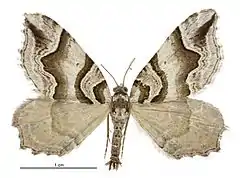Helastia angusta
Helastia angusta is a moth of the family Geometridae. This species is endemic to New Zealand. It is classified as "At Risk, Relict'" by the Department of Conservation.
| Helastia angusta | |
|---|---|
 | |
| Male | |
| Scientific classification | |
| Kingdom: | |
| Phylum: | |
| Subphylum: | |
| Class: | |
| Order: | |
| Family: | |
| Genus: | |
| Species: | H. angusta |
| Binomial name | |
| Helastia angusta Craw, 1987[1] | |
Taxonomy
This species was first described by Robin C. Craw in 1987 using a specimen collected by John S. Dugdale at Moke Lake.[2][3] The holotype specimen is held at the New Zealand Arthropod Collection.[2]
Description
Craw described the species as follows:
Medium sized (r.f.l. 13.5-14.1 mm) narrowly falcate forewing. Upperside forewing coloured whitish purplish brown with darker transverse basal, antemedial and postmedial lines; oblique purplish brown apical streak. Postmedial line with distinct double toothed median projection; basal line evenly curved, no angular projection. Male antennae ciliated.[3]
Although similar in appearance to its relative H. expolita, H.angusta can be distinguished by its narrower forewing and the more rounded appearance of its underside basal line.[3]
Distribution
This species is endemic to New Zealand.[1][4] It occurs in the Otago Lakes and Mackenzie areas.[5]
Host species and habitat
The host species for the larvae of H. angusta is unknown but it has been hypothesised it may be a shrub species.[5] Moth species closely related to H. angusta have larvae that feed Helichrysum lanceolatum.[6]
Conservation status
This moth is classified under the New Zealand Threat Classification system as being "At Risk, Relict".[7]
References
| Wikimedia Commons has media related to Helastia angusta. |
| Wikispecies has information related to Helastia angusta. |
- "Helastia angusta Craw, 1987". www.nzor.org.nz. Landcare Research New Zealand Ltd. Retrieved 2018-05-16.
- Dugdale, J. S. (1988). "Lepidoptera - annotated catalogue, and keys to family-group taxa" (PDF). Fauna of New Zealand. 14: 68. Retrieved 15 May 2018.
- Craw, R. C. (2 February 2012). "Revision of the genus Helastia sensu stricto with description of a new genus (Lepidoptera: Geometridae: Larentiinae)". New Zealand Journal of Zoology. 14 (2): 269–293. doi:10.1080/03014223.1987.10422997.
- Gordon, Dennis P., ed. (2010). New Zealand inventory of biodiversity. Volume two. Kingdom animalia : chaetognatha, ecdysozoa, ichnofossils. Vol. 2. Christchurch, N.Z.: Canterbury University Press. p. 459. ISBN 9781877257933. OCLC 973607714.
- Patrick, Brian; Dugdale, John S. (2000). Conservation status of the New Zealand lepidoptera (PDF). Wellington, N.Z.: Department of Conservation, New Zealand. p. 24. ISBN 0478218672. OCLC 154670803.
- Pawson, S.M.; Emberson, R.M. (2000). "The conservation status of invertebrates in Canterbury" (PDF). Conservation Advisory Science Notes. 320: 1–64.
- Hoare, R.J.B.; Dugdale, J.S.; Edwards, E.D.; Gibbs, G.W.; Patrick, B.H.; Hitchmough, R.A.; Rolfe, J.R. (2017). Conservation status of New Zealand butterflies and moths (Lepidoptera), 2015 (PDF). Wellington, New Zealand: New Zealand Department of Conservation. p. 7. ISBN 9781988514383.